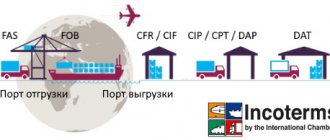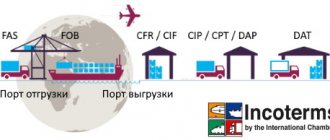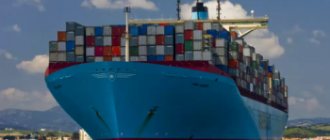Cargo transportation is an integral part of foreign economic activity. The success of an international transaction, the cost and safety of delivery depend on the delivery method, the choice of carrier, and transportation conditions. One of the important tasks is to understand the intricacies of freight. To do this, you need to understand the meaning of the term, the principles for calculating rates, and find out the terms of the charter agreement.
What is freight?
In simple words, the term freight means the delivery charge. It is paid by the charterer or the shipper of the cargo to the shipowner. It is established by the terms of the contract or the provisions of the law. The amount of freight, in the absence of an agreement between the parties, is formed taking into account the rates that apply at the place of loading. The subject of the agreement is the rental of the vessel, but not the transportation of cargo.
Other meanings of the word:
- Delivery by chartered ship. The parties agree on transportation conditions, assess the condition of the cargo;
- A transportation contract with a description of the cargo, indicating the responsibilities of the cargo carrier, and the amount of payment.
If the actual volume of cargo shipped exceeds that specified in the contract, the freight amount will be higher. If there is less cargo, the shipowner has the right to demand compensation for lost profits. In a situation where the freight established by the contract is paid regardless of the volume of cargo, the term lumpsum is used.
International transportation without problems
Get a free consultation
Call us on our toll-free number, or fill out the form and we will promptly contact you!
8 800 700 0952 Feedback
Paperwork and route planning
Marine brokers will help you understand all the nuances, prepare documents correctly and calculate the freight rate. Indeed, in this article we have listed only the main factors affecting the cost of transportation.
Our logisticians create the optimal route individually for each client. We work with many shipowners, so we can offer several cargo routes and a full range of cargo services along the way. The shortest route is not always the most profitable.
To get detailed information or charter a vessel, contact us by phone or leave a request on the website. International logistics guarantees prompt and safe delivery of your goods by sea to anywhere in the world.
The professionalism of our team is a guarantee of your peace of mind.
Call us at +7 for advice.
What determines the cost of freight?
Freight cost is not fixed. It depends on the following factors:
- Route length. The further away the shipping point is, the more expensive the delivery;
- Route safety. If the ship has to cross combat zones, shipping costs will increase;
- Route through the Bosphorus or Panama Canals. A fee is charged for the passage of cargo ships;
- The need for loading and unloading operations;
- Transportation of dangerous goods.
The final cost is also affected by the need to pay additional internal or external duties.
How is the freight rate calculated?
If we are talking about regular deliveries, the freight rate is calculated taking into account the dimensions and type of cargo. In tramp cargo transportation, the rate is determined by the contract: the ship does not move along a given route and the ship owner does not know how much time he will spend sailing to ports and loading and unloading operations. Tariffs for tramp transportation are usually higher than for linear transportation. The cost and conditions of transportation of goods are negotiated in each case separately.
The freight rate consists of a base freight charge and payments for additional services. The base fee depends on the size and type of cargo, and the duration of the route. Additionally, payments are provided to reimburse the shipowner's costs. This includes the following types of surcharges:
- BAF - for fuel. Adjusted every month taking into account fluctuations in world prices;
- TNS – compensation of port expenses. Paid at port terminals for loading, unloading, handling;
- DOCS – document processing fee at ports of departure and arrival.
The list of additional paid services includes maintaining temperature conditions for a certain category of goods, creating conditions for oversized or dangerous goods.
COMPONENTS OF FREIGHT RATES
All-In – a rate that includes all the surcharges listed below.
BAF (Bunker Adjustment Factor) - indexation of changes in fuel prices.
B/L (Bill of Lading) - bill of lading - a sea waybill for the transportation of goods, issued by the cargo carrier to the cargo owner. Confirms ownership of the shipped goods. Can be drawn up: in the name of bearer, in the name of the recipient (nominal), by order of the sender or recipient (order);
BAS (Base Rate) - base rate.
BFR - sea freight.
Booking (Booking, Bukirovka) - booking all or part of the vessel’s cargo capacity (space on the vessel) for the transportation of cargo.
CAF (Currency Adjustment Factor) - indexation of exchange rate differences between currencies.
Congestion Surcharge is a surcharge that is levied to compensate for the costs associated with the delay of ships in congested ports.
CAF (Currency Adjustment Factor) is an additional fee to the base freight rate. The value depends on changes in exchange rates. May change monthly or quarterly. Usually quoted as a percentage of the base freight rate.
Carrier is a person who uses their own or leased vehicles to transport goods, on the basis of an agreement concluded with the sender.
CFR - cost and freight (cost and freight) - international trade term Incoterms. CFR delivery terms mean that the seller pays for the delivery of goods to the port, loading and freight of the vessel, and also ensures the passage of customs procedures when exporting goods (including paying duties). The buyer pays for insurance of the goods. The risk of loss or damage, as well as additional costs after the goods pass the ship's rail, passes to the buyer. CFR delivery terms are used only in case of transportation of goods by sea or river transport.
Charter - an agreement between the owner of a vehicle and the lessee (charterer) to rent a vehicle for a certain period or flight;
CIF - Cost, Insurance and Freight (cost, insurance and freight) - an Incoterm term. CIF delivery terms are largely identical to CFR terms. In addition to liability under CFR terms of delivery, the seller for CIF terms must obtain a transferable insurance policy to cover the risks associated with the delivery of cargo by insurance companies. The seller's responsibility for the goods ends when the goods have been delivered to the ocean carrier or loaded on board the vessel, depending on the terms of the contract.
CIP - Carriage and Insurance Paid to (freight/carriage and insurance paid to) is an international trade term Incoterms. The term means that the seller will deliver the goods to a named carrier. In addition, the seller is obliged to pay the costs associated with transporting the goods to the named destination. The seller's responsibility ends when he delivers the goods to the carrier nominated by the buyer. The buyer bears all risks and any additional costs incurred after the goods have been delivered. This term is similar to CPT, except that the seller also pays for the insurance. Also, under the terms of CIP, customs procedures for exporting goods are the responsibility of the seller.
COC (Carrier's Owned Container) - the container is the property of the carrier;
Consignee - recipient of the cargo.
CPT - Carriage Paid To is an international Incoterm trade term that applies to all modes of transport, including intermodal transport. The seller bears the costs of freight and transportation to the destination. The buyer pays for cargo insurance. Risks pass when the goods are delivered to the first carrier.
CUC (Chassis Using Charge) - charge for using the chassis.
CY (Container yard) - container terminal.
Certificate of Origin - a certificate certifying that a given imported product was manufactured in a given place.
DAF - Delivered At Frontier (delivered at the border) - Incoterms delivery terms. Can be used for delivery by rail or road transport. The seller is not responsible for transporting the goods to the border and paying duties. The buyer is responsible for both customs clearance of the goods and transportation from the border to his location. Risks pass when the cargo reaches the border.
DC (Dry container) - type of container (dry container). A container designed for the transportation of “dry” cargo that does not require special temperature conditions.
DDF (Documentation Fee - Destination) - fee for processing documents at the port of delivery.
DDP - Delivered, Duty Paid (delivered, duty paid) - Incoterms delivery terms. Used to indicate the place of arrival; The seller's responsibility ends when the goods are delivered to the specified place in the buyer's country; all risks, all costs for delivery of goods (taxes, duties, etc.), responsibility for damage and loss of goods, including duties and other payments paid upon import, up to this point are borne by the seller, and he is also not responsible for customs clearance; provisions may be added to exempt the seller from paying certain additional formalities; This type of distribution of responsibility can be used regardless of the type of supply.
DDU - Delivered Duty Unpaid (delivered, duty not paid) - Incoterms term; used to indicate the place of arrival; The seller's responsibility ends when the goods are delivered to the specified place in the buyer's country; all risks, all costs for delivery of goods (taxes, duties, etc.), responsibility for damage and loss of goods (except for duties and other payments paid upon import) up to this point are borne by the seller; if the buyer did not have time to prepare the goods for import in time, he himself is not responsible for this; provisions may be added obliging the seller to pay certain additional formalities; This type of distribution of responsibility can be used regardless of the type of supply.
Demurrage - penalties levied for excess use of a container from the moment it is unloaded at the terminal until the moment it is removed from the terminal. For ships - payment for vessel demurrage in excess of the agreed time for loading and unloading operations - laytime.
DEQ - Delivered Ex Quay (delivered from the quay) - an international trade term Incoterms. Means the same as DES, except that the transfer of risk does not occur until the goods are unloaded at the port of destination.
DES - Delivered Ex Ship (delivery from a vessel) - a condition of an international sales contract contained in Incoterms. The seller is deemed to have fulfilled the terms of the contract when he places the goods, not cleared for import, at the disposal of the buyer on board the ship at the named port of destination. The seller must bear all costs and risks of bringing the goods to the named port of destination until they are unloaded.
Detention - penalties levied for excess use of a container from the moment it is removed from the terminal until the empty container is returned to the port.
DHC (Handling Charge - Destination) - costs for transshipment at the delivery port.
Disbursement Account - a document containing a list of expenses incurred for services at the port.
Discharging - unloading.
DOCS (documentation), DocsFee - local line agent fees for document processing. May be charged both per bill of lading and per container.
DOOR - delivery from/to door - a condition of transportation at departure/arrival, meaning that the cost of transportation includes services for sending from/to the front doors/warehouse of the sender/recipient.
ETA (Estimated Time of Arrival) - expected date of arrival.
ETD (Estimated Time of Departure) - expected dispatch date.
EXW - Ex Works (from the place of work, pickup) - Incoterms term. The seller’s responsibility ends when the goods are transferred to the buyer or the carrier hired by him at the seller’s premises (warehouse, store, etc.); the seller is not responsible for loading the goods onto transport; the buyer bears all costs for removing the goods from the warehouse, transportation, customs clearance, etc.
EBS (Emergency Bunker Surcharge) is a temporary surcharge associated with an increase in fuel prices.
DTHC (from Destination Terminal Handling Charge) is a fee charged by a container line for Terminal Handling at the port of unloading (see Terminal Handling).
FAS-free alongside ship (Free along the side of the ship) is an international trade term Incoterms. The seller bears the costs of delivery to the port of departure. The seller fulfills his obligations to deliver the goods at the moment when the goods are placed alongside the ship at the berth (at the agreed port of shipment). The buyer pays the costs of loading, chartering the vessel, insurance, unloading and delivery to the destination. Risks pass at the moment of delivery to the berth of the loading port.
FCA - Free Carrier (... named place) - an Incoterms trade term meaning that the seller fulfills his obligation to deliver when he delivers the goods, cleared for export, to the carrier nominated by the buyer at the named place. The place of delivery affects the obligation to load and unload the goods at that place. If delivery occurs at the seller's premises, the seller is not responsible for shipment. If delivery occurs at any other place, the seller is not responsible for shipment.
Feeder (Feeder) is a sea carrier that transports cargo (containers) on ships of small displacement, over short distances between ports, usually of the same basin, or delivers containers from/to the port of loading onto an ocean-going vessel;
FFC (Freight Forwarder Commission/Brokerage - Origin) - brokerage commission.
FI (Free In) - free from loading - a condition of transportation, meaning that freight does not take into account the cost of loading onto the ship.
FICY (Free in/Container yard) - loading at the port at the expense of the sender, delivery to the container terminal at the expense of the line.
FIFO (Free in/Free out) - loading and unloading at the expense of the sender.
FILO (Free in/Liner out) - loading at the expense of the sender, unloading at the expense of the line.
FIOS (Free in/out) - loading and unloading at the expense of the sender.
FCL (Full Container Loading) - a container filled with cargo for one recipient.
FO (Free Out) - free from unloading - a condition of carriage, meaning that freight does not take into account the cost of unloading from the vessel.
FOB - Free on Board (free on board, literally - free on board the ship) is an international trade term Incoterms. The seller is obliged to deliver the goods to the port and load them onto the ship specified by the buyer; The costs of delivering the goods on board the vessel are borne by the seller. In some ports, for FOB deliveries, loading costs are borne by the buyer. The risk of accidental loss of property or damage to it rests with the seller - until the goods cross the side of the ship, and with the buyer - from that moment. As a rule, title to the goods passes from the seller to the buyer at the same time as the risk passes.
Freight - the fee for transporting goods.
GRI is a planned increase in the base rate from a certain date.
Gross Weight (Gross Weight) - the weight of the product together with internal packaging (inseparable from the product before its consumption) and external packaging (boxes, bags, barrels, etc.).
GRI (General Rate Surcharge) – the general increase in the rate applied by the line compared to the previous period.
GAC (Gulf of Aden Surcharge) is a surcharge for transportation along a route that runs through the Gulf of Aden.
HWS (Heavy-Weight Surcharge) – a surcharge for excess cargo over a certain set value (analogous to OWS).
HC (High Cube) - container type. Container (High Cube Container) with increased capacity due to increased height compared to a standard container.
Heavy Lift Charge - a surcharge for exceeding a certain weight of cargo.
IMO Surcharge - surcharge for dangerous goods.
Indossament is a transfer inscription on the back of a security, according to which the rights under this security are transferred from one person to another. The person making the endorsement is called the endorser. There is a distinction between full (nominal) endorsement and bearer endorsement, when the endorsement does not contain the name in whose favor the endorsement is made, i.e. it consists of one signature of the endorser. The objects of transfer through endorsement can be bills, checks, bills of lading and other securities.
International Commercial Terms, INCOTERMS (Incoterms) - a collection of international trade terms published by the International Chamber of Commerce. The dictionary contains terms for the basic terms of delivery related to the transportation process, registration of deliveries, etc.
ISPS - Port Security Charge.
IMO Surcharge is a surcharge for the transportation of dangerous goods.
LCL (Less Container Loading) - a container filled with cargo for different recipients, groupage cargo.
LI (Liner In) - linear loading conditions, meaning that the cost of loading onto the ship is included in the freight rate.
LI-Door (Liner in / Door) - loading at the port at the expense of the line, delivery to the client’s “door”.
LIFO (Liner in/Free out) - loading at the expense of the line, unloading at the expense of the sender.
LILO (Liner in/out) - loading and unloading due to the line, i.e. included in the freight rate - full line terms.
LO (Liner Out) - Linear arrival terms, meaning that the cost of unloading from the vessel is included in the freight rate.
Loading – loading.
Manifest - a document containing a list of bills of lading and presented to customs, as well as agents and stevedores at ports of destination. Usually it includes a trace, data: name of the vessel, port of loading, numbers of bills of lading, name, weight, volume and quantity of cargo for each bill of lading, names of shippers and consignees of the cargo, marking of the cargo.
Laytime - the period during which the carrier provides a vessel for loading cargo and keeps it under loading cargo without additional payments to freight, is determined by agreement of the parties to the charter, in the absence of such an agreement, by the terms usually accepted at the port of loading.
Notify party - the party that the carrier must notify about the arrival of the cargo. Usually the freight forwarder or other representative of the recipient at the port.
ODF (Documentation Fee - Origin) - fee for processing documents at the port of departure;
OT (Open Top) - container type. (Open top) A container with an open top for easier loading, closed with a tarpaulin cover.
OHC (Handling Charge - Origin) - costs for transshipment at the port of departure.
Order bill of lading - a bill of lading under which the cargo is transferred either to the “order” of the shipper, or to the “order” of the consignee, or to the “order” of the bank, or according to the endorsement of the one whose “order” it was drawn up. If the order bill of lading does not indicate that it is drawn up to the “order” of the recipient, then it is considered to be drawn up to the “order” of the sender. The bill of lading and, accordingly, the right to the cargo is transferred to another person using an endorsement - an endorsement
OTHC (from Origin Terminal Handling Charge) is a fee charged by a container line for Terminal Handling at the port of loading (see Terminal Handling).
OWS (Over-Weight Surcharge) – a surcharge for excess weight of cargo over a certain set value (analogous to HWS).
PCS (Panama Channel Surcharge) - fee for passage of the Panama Canal.
PSS (Peak Season Surcharge) – seasonal allowances.
POD (Port of Delivery) - destination port.
POL (Port of Loading) - port of loading.
PSE (Port Security Charge - Export) - fee for security at the port during export.
PSS (Peak Season Surcharge) is a surcharge due to the seasonal increase in traffic volume at certain times of the year.
PCS (Port Congestion Surcharge) is a surcharge due to overload of container areas of the port.
Quality Certificate - a document confirming the product’s compliance with quality indicators, technical characteristics, safety requirements for human life and health, and the natural environment, stipulated by the terms of the contract.
RF (Reefer container) - type of container. A refrigerated container is designed for transporting goods that require temperature control.
SEA (seafreight),O/F(oceanfreight) - sea freight.
SEC (security charges) - port security fee.
Shipper - sender of the cargo.
SOC (Shipper's Owned Container) - the container is the property of the client.
Statement - a document drawn up instead of a timesheet in cases where there are no necessary conditions for recording and calculating lay time. Contains data on the time of arrival of the vessel at the port, the use of lay time, indicating the duration and reasons for breaks and downtime. According to the statement, a timesheet is drawn up and settlements are made with charterers for demurrage and dispatch.
Storage — rate for excess storage of cargo at the port. It is counted from the moment of unloading at the terminal until the moment of removal from the terminal. Charged at port rates. Usually quoted per TEU and has an increasing scale (the longer the cargo is in the port, the more expensive each next day of storage.
STC (Said To Contain) - stated to contain.
SCS (Suez Channel Surcharge) - fee for passage of the Suez Canal.
TC (Tank container) - type of container. The tank container is designed for transporting gases and liquid cargo.
TEU (Twentyfoot Equivalent Unit) is a unit of cargo measurement equal to the volume of a 1x20-foot container. 1x40ft container = 2TEU.
THC (terminal handling charges) - costs for transshipment at the port.
Time charter is a contract for chartering a vessel for a time. The shipowner provides the charterer with a vessel for a certain period of time for an agreed fee. Typically, a time charter provides that the owner of the ship bears the costs of maintaining the ship's crew, maintaining the ship in a serviceable condition and insuring it, and the charterer, in addition to paying the shipowner for using the ship, assumes payment for bunker, water, port, canal dues, and other current and operating costs.
Time sheet - a list of lay time records for cargo operations. The timesheet is drawn up at each port of unloading/loading of the vessel and signed by the captain and the charterer’s representative. Timesheet is the basis for calculating demurrage and dispatch.
WarRisk - military risks, charged in ports located in the war zone.
Waybill (waybill) is a document used to document the release and acceptance of various goods, as well as the transportation of goods. Regulates the relationship between the sender, carrier and recipient of the cargo;
Wharfage - port duty.
WSC (Winter Surcharge) is a winter surcharge, charged in ports where there is a possibility of icing of the port waters. Valid during winter.
War Risk Surcharge – used when a ship enters the ports of countries engaged in military operations.
WS (Winter Surcharge) - surcharge in winter.
Freight loading conditions
They provide for the obligation to pay for loading and unloading operations by the sender or recipient of the cargo. The conditions may be as follows:
- Free Out (FO) – transportation without unloading. This type of work is not included in the freight;
- Free In – delivery without loading. Payment for loading the goods at the port of unloading is not included in the freight price;
- Liner Out (LO) – a delivery condition when handling of cargo, container and their unloading are included in the price;
- Liner In (LI) – a condition of transportation when unloading and loading are included in the transportation rate.
Loading conditions are specified in the supply contract and transport documentation, which establishes the parties’ obligations to pay for freight stages.
The cost depends on the freight loading conditions.
Types of charter agreements
In the field of merchant shipping, maritime law distinguishes the following types of charters:
- chartering for a flight / voyage charter (the agreement is concluded for one or more transportations);
- time charter (renting a vessel for a specified time);
- slot charter (a cell/slot/container is rented on the vessel);
- bareboat charter (under the contract the vessel is rented without a crew);
- demise charter (the vessel is rented along with equipment and crew).
Specialized types
Return freight (eng. back freight) - compensation/payment for return transportation (chartering) services in the event that the cargo cannot be delivered at the port of destination for reasons beyond the control of the carrier (for example, if unloading at the port of destination was not permitted within the allotted time ). Charged to the sender.
“Dead freight” is the missing part of the cargo declared for loading, which is subject to payment for transportation. “Dead freight” is declared by the captain of the vessel immediately after loading, if such a right is provided for by the terms of the contract. Such a solution can act as an alternative to paying for demurrage - sanctions for demurrage of a vessel during loading.
Sea freight
Sea freight is carried out on the basis of an agreement, which stipulates the procedure for hiring a vessel, the responsibilities of the charterer and the charterer, and determines the terms of payment for delivery. In international shipping, there are different practices for allocating costs and responsibilities between the shipper and the recipient. There are two types of charter agreement:
- Bareboat charter. The shipowner provides the charterer with a vessel without a crew.
- Time charter. Involves the transfer of a vessel along with its crew for a specific period.
What documents are needed
Sea transportation, loading and unloading operations are accompanied by special documents that are necessary for both the owner, the cargo carrier, and customs:
- Bill of lading. It states the ownership of the goods being delivered. The document allows you to resell the goods while still on the route, with all records of transactions being entered;
- Navigator's receipt. Confirms the transfer of goods to the carrier;
- Sea waybill. Confirms the existence of an agreement that defines the carrier’s obligation to deliver the cargo to the port of receipt;
- Packing list. Contains data on all transported goods and cargo places.
The package of documents also includes a dock receipt. It confirms that the cargo has arrived at the port for further transportation by sea.
Sea transportation is in demand due to a number of advantages:
- Availability. Transportation by ship allows you to bring goods in large quantities and save money;
- Safety. Delivery by sea allows you to transport goods safe and sound.
Entrepreneurs can deliver cargo of various types by sea: oversized, dangerous, valuable, fragile.
When transporting by sea, containers are usually used - universal for all types of land transport. They can easily be reloaded onto railway trains or vehicles for further land shipment from the port.
Delivery by sea has its own risks and features:
- Delays in delivery due to weather conditions. Due to bad weather, ships may lose time en route and wait out bad weather at the port of departure;
- Impossibility of door to door delivery. To do this, the customer must choose multimodal transportation and pay extra for transshipment work and land delivery;
- Impossibility of urgent delivery. For emergencies, air travel is preferred.
Despite the disadvantages, sea freight is in great demand among foreign trade participants due to its availability and the ability to deliver large consignments of cargo.
Transportation of goods around the world
Get a free consultation
Call us or fill out the feedback form and we will contact you as soon as possible.
8 800 700 0952 Feedback








